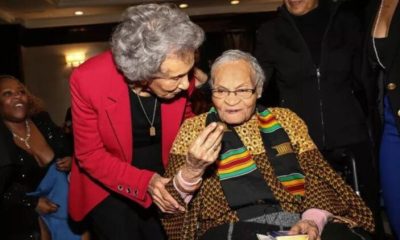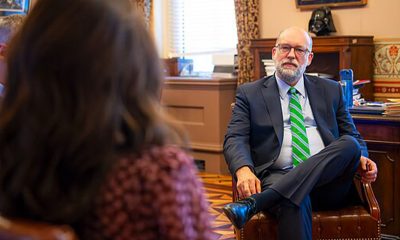Arts and Culture
Dr. King’s Connection to Oakland Bay Area
As the Bay Area prepares to celebrate another national holiday honoring the life and work of the Rev. Dr. Martin Luther King, Jr., the Post News Group staff is reminded of how intertwined Dr. King’s mission and family’s legacy is with the newspaper and the Oakland Bay Area.
Gay Plair Cobb, wife of Post publisher Paul Cobb, marched with Dr. King in 1963 at the March for Jobs in Washington. She still is carrying on that tradition of demanding economic justice with her leadership of the Oakland Private Industry Council.
Gay also founded the Nelson Mandela Training Center that prepares minorities for construction-related jobs and she is still advocating for more jobs in the Bay Area’s economic boom.
“If Dr. King were alive today, he would be urging me and others to continue to speak the truth of economic justice through jobs to the powerful at the city, county, state and federal levels of government as well as the business leaders,” said Paul Cobb.
“When we lived in Atlanta in 1973 through 1976, Gay and I—along with Beni Ivey, who is now the Executive Director of Martin Luther King III’s center—had the opportunity to work with the late Coretta Scott King, Congressman John Lewis and Senator Julian Bond,” he said.
The Post archives record how Dr. King spoke at the Oakland Auditorium in December 28, 1962, before a 7,000-plus crowd where the themes of his famous March on Washington speech were tested.
Many of the economic justice ideas that King presented there were a continuation of the calls for reparations and economic restorative justice from the Reconstruction Era Freedmen’s Bank experience that had been presented months earlier at the McClymonds High School “Mind of the Ghetto” Conference, which was sponsored by the AfroAmerican Association.
At that conference, Malcolm X, Don Warden, Cassius Clay, (Muhammad Ali) Floyd McKissick, Will Ussery, Thomas Berkeley, Paul Cobb, Elijah Turner and many other Black leaders participated.
Dr. King was also tutored by the late Dr. W. Hazaiah Williams of Berkeley, while they were students at Boston University.
Rev. Ray Williams, pastor of Morning Star Baptist who attended the historic event, said: “Pastor Edward Stovall of the progressive Baptist Church of Berkeley led a group of ministers into history. He reached across the denominational lines to invite ministers of other faiths, including Rev. Richard Foster, pastor of Cooper AME Zion, Reverend Roy Nichols, a Methodist Leader, activist George Henderson of the Star Baptist Church, Rev. Peyton E. Pierce, President of the Baptist Minister Union, and several leaders of the Catholic Church.”

Paul Cobb, Gay Plair Cobb, Martin Luther King III, Beni Ivey, Sherry Ivey and the late John Ivey during King’s visit to the Post in 2014.
“The predominantly Black audience signaled for a political awakening that set the stage for the elections of Attorney Thomas Berkeley and Barney Hilburn to the Oakland Board of Education, and Byron Rumford to the State Assembly,” said Williams.
Rev. Frank Pinkard, pastor of Evergreen Baptist Church, said, “King captured our desire for economic redemption when he opened his March on Washington speech by saying the US government had given Blacks a note marked ‘insufficient funds.’ That part of the speech should have been equally glamorized as the famous ‘I have a dream’ phrase.”
During an excerpt from that speech, King said: “We have come to our nation’s capital to cash a check. When the architects of our republic wrote the magnificent words of the Constitution and the Declaration of Independence, they were signing a promissory note to which every American was to fall heir.
“This note was a promise that all men, yes Black men as well as white men, would be guaranteed the inalienable rights of life, liberty and the pursuit of happiness.
“It is obvious today that America has defaulted on this promissory note insofar as her citizens of color are concerned. Instead of honoring this sacred obligation, America has given the Negro people a bad check, a check which has come back marked ‘insufficient funds.’
“But we refuse to believe that the bank of justice is bankrupt. We refuse to believe that there are insufficient funds in the great vaults of opportunity of this nation. So we have come to cash this check — a check that will give us upon demand the riches of freedom and the security of justice.”
In 1965, Post publisher Paul Cobb led a group of Oaklanders to march with and report on the Selma to Montgomery March for Voting Rights.
Cobb noted that the father of Assemblymember Rob Bonta was also a part of that march.
Cobb said he sees the BAMBD (Black Arts Movement Business District), as well as the Anti Police-Terror Project’s Spokescouncil Movement, as continuations of the King legacy of activism.
This week Cat Brooks and Tur-Ha Ak will lead activities where people can gather to participate and advocate for direct actions to make positive changes for people in need.
Advice
BOOK REVIEW: Let Me Be Real With You
At first look, this book might seem like just any other self-help offering. It’s inspirational for casual reader and business reader, both, just like most books in this genre. Dig a little deeper, though, and you’ll spot what makes “Let Me Be Real With You” stand out.

By Terri Schlichenmeyer
Author: Arshay Cooper, Copyright: c.2025, Publisher: HarperOne, SRP: $26.00, Page Count: 40 Pages
The hole you’re in is a deep one.
You can see the clouds above, and they look like a storm; you sense the wind, and it’s cold. It’s dark down there, and lonesome, too. You feel like you were born there — but how do you get out of the deep hole you’re in? You read the new book “Let Me Be Real With You” by Arshay Cooper. You find a hand-up and bring someone with you.
In the months after his first book was published, Cooper received a lot of requests to speak to youth about his life growing up on the West Side of Chicago, his struggles, and his many accomplishments. He was poor, bullied, and belittled, but he knew that if he could escape those things, he would succeed. He focused on doing what was best, and right. He looked for mentors and strove to understand when opportunities presented themselves.
Still, his early life left him with trauma. Here, he shows how it’s overcome-able.
We must always have hope, Cooper says, but hope is “merely the catalyst for action. The hope we receive must transform into the hope we give.”
Learn to tell your own story, as honestly as you know it. Be open to suggestions, and don’t dismiss them without great thought. Know that masculinity doesn’t equal stoicism; we are hard-wired to need other people, and sharing “pain and relatability can dissipate shame and foster empathy in powerful ways.”
Remember that trauma is intergenerational, and it can be passed down from parent to child. Let your mentors see your potential. Get therapy, if you need it; there’s no shame in it, and it will help, if you learn to trust it. Enjoy the outdoors when you can. Learn self-control. Give back to your community. Respect your financial wellness. Embrace your intelligence. Pick your friends and relationships wisely. “Do it afraid.”
And finally, remember that “You were born to soar to great heights and rule the sky.”
You just needed someone to tell you that.
At first look, this book might seem like just any other self-help offering. It’s inspirational for casual reader and business reader, both, just like most books in this genre. Dig a little deeper, though, and you’ll spot what makes “Let Me Be Real With You” stand out.
With a willingness to discuss the struggles he tackled in the past, Cooper writes with a solidly honest voice that’s exceptionally believable, and not one bit dramatic. You won’t find unnecessarily embellished stories or tall tales here, either; Cooper instead uses his real experiences to help readers understand that there are few things that are truly insurmountable. He then explains how one’s past can shape one’s future, and how today’s actions can change the future of the world.
“Let Me Be Real With You” is full of motivation, and instruction that’s do-able for adults and teens. If you need that, or if you’ve vowed to do better this coming year, it might help make you whole.
Alameda County
Bling It On: Holiday Lights Brighten Dark Nights All Around the Bay
On the block where I grew up in the 1960s, it was an unwritten agreement among the owners of those row homes to put up holiday lights: around the front window and door, along the porch banister, etc. Some put the Christmas tree in the window, and you could see it through the open slats of the blinds.

By Wanda Ravernell
I have always liked Christmas lights.
From my desk at my front window, I feel a quiet joy when the lights on the house across the street come on just as night falls.
On the block where I grew up in the 1960s, it was an unwritten agreement among the owners of those row homes to put up holiday lights: around the front window and door, along the porch banister, etc. Some put the Christmas tree in the window, and you could see it through the open slats of the blinds.
My father, the renegade of the block, made no effort with lights, so my mother hung a wreath with two bells in the window. Just enough to let you know someone was at home.
Two doors down was a different story. Mr. King, the overachiever of the block, went all out for Christmas: The tree in the window, the lights along the roof and a Santa on his sleigh on the porch roof.
There are a few ‘Mr. Kings’ in my neighborhood.
In particular is the gentleman down the street. For Halloween, they erected a 10-foot skeleton in the yard, placed ‘shrunken heads’ on fence poles, pumpkins on steps and swooping bat wings from the porch roof. They have not held back for Christmas.
The skeleton stayed up this year, this time swathed in lights, as is every other inch of the house front. It is a light show that rivals the one in the old Wanamaker’s department store in Philadelphia.
I would hate to see their light bill…
As the shortest day of the year approaches, make Mr. King’s spirit happy and get out and see the lights in your own neighborhood, shopping plazas and merchant areas.
Here are some places recommended by 510 Families and Johnny FunCheap.
Oakland
Oakland’s Temple Hill Holiday Lights and Gardens is the place to go for a drive-by or a leisurely stroll for a religious holiday experience. Wear a jacket, because it’s chilly outside the Church of Jesus Christ of Latter-day Saints, at 4220 Lincoln Ave., particularly after dark. The gardens are open all day from 9 a.m. to 9 p.m. with the lights on from dusk until closing.
Alameda
Just across the High Street Bridge from Oakland, you’ll find Christmas Tree Lane in Alameda.
On Thompson Avenue between High Street and Fernside drive, displays range from classic trees and blow-ups to a comedic response to the film “The Nightmare Before Christmas.” Lights turn on at dusk and can be seen through the first week in January.
Berkeley
The Fourth Street business district from University Avenue to Virginia Street in Berkeley comes alive with lights beginning at 5 p.m. through Jan. 1, 2026.
There’s also a display at one house at 928 Arlington St., and, for children, the Tilden Park Carousel Winter Wonderland runs through Jan. 4, 2026. Closed Christmas Day. For more information and tickets, call (510) 559-1004.
Richmond
The Sundar Shadi Holiday Display, featuring a recreation of the town of Bethlehem with life-size figures, is open through Dec. 26 at 7501 Moeser Lane in El Cerrito.
Marin County
In Marin, the go-to spot for ‘oohs and ahhs’ is the Holiday Light Spectacular from 4-9 p.m. through Jan. 4, 2026, at Marin Center Fairgrounds at 10 Ave of the Flags in San Rafael through Jan. 4. Displays dazzle, with lighted walkways and activities almost daily. For more info, go to: www.marincounty.gov/departments/cultural-services/department-sponsored-events/holiday-light-spectacular
The arches at Marin County Civic Center at 3501 Civic Center Dr. will also be illuminated nightly.
San Francisco
Look for light installations in Golden Gate Park, chocolate and cheer at Ghirardelli Square, and downtown, the ice rink in Union Square and the holiday tree in Civic Center Plaza are enchanting spots day and night. For neighborhoods, you can’t beat the streets in Noe Valley, Pacific Heights, and Bernal Heights. For glee and over-the-top glitz there’s the Castro, particularly at 68 Castro Street.
Livermore
The winner of the 2024 Great Light Flight award, Deacon Dave has set up his display with a group of creative volunteers at 352 Hillcrest Avenue since 1982. See it through Jan. 1, 2026. For more info, go to https://www.casadelpomba.com
Fremont
Crippsmas Place is a community of over 90 decorated homes with candy canes passed out nightly through Dec. 31. A tradition since 1967, the event features visits by Mr. and Mrs. Claus on Dec. 18 and Dec. 23 and entertainment by the Tri-M Honor Society at 6 p.m. on Dec. 22. Chrippsmas Place is located on: Cripps Place, Asquith Place, Nicolet Court, Wellington Place, Perkins Street, and the stretch of Nicolet Avenue between Gibraltar Drive and Perkins Street.
Activism
Oakland Mandala: A New Event and Point of Beauty
Led by Oakland resident Mandisa Snodey, a group of artists conceived and painted the mandala on Linden street near McClymonds High School as part of a Black Friday event the day after Thanksgiving to support Black-owned businesses.

By Post Staff
The first annual Oakland Mandala, sponsored by Miges Odanes Village Center, Credo Studio, and the Mandala Medicine Movement is on view now until the winter rains wash it away.
Led by Oakland resident Mandisa Snodey, a group of artists conceived and painted the mandala on Linden street near McClymonds High School as part of a Black Friday event the day after Thanksgiving to support Black-owned businesses.
“This is a lineage-based community art project, using temporary paint, aimed at community building, neighborhood beautification, and celebration of the arts and all people’s creativity,” Snodey said. “The theme of this year’s mandala was ‘Unified Humanity.’
“We gathered at 7 a.m. on Friday for the Black Friday Block Party and finished painting close to sunset. Our youngest painter was 2 years old and our eldest close to 70 years young: we had families, community members, professional artists, and people who have never painted before all working together.”
Snodey urges residents to come visit and take a picture with the mandala. It’s located between 28th and 30th on Linden Street in West Oakland. If you post on social media, please use the hashtags “#oaklandmandala” and “#mandalamedicinemovement.”
Snodey extends special thanks to the Bay Area Mural Program (BAMP), Few and Far Women, “and other Bay Area Artists who participated and made this first annual mandala a beautiful success.”
-

 Alameda County4 weeks ago
Alameda County4 weeks agoSeth Curry Makes Impressive Debut with the Golden State Warriors
-

 Bay Area3 weeks ago
Bay Area3 weeks agoPost Salon to Discuss Proposal to Bring Costco to Oakland Community meeting to be held at City Hall, Thursday, Dec. 18
-

 #NNPA BlackPress4 weeks ago
#NNPA BlackPress4 weeks agoFBI Report Warns of Fear, Paralysis, And Political Turmoil Under Director Kash Patel
-

 Activism3 weeks ago
Activism3 weeks agoMayor Lee, City Leaders Announce $334 Million Bond Sale for Affordable Housing, Roads, Park Renovations, Libraries and Senior Centers
-

 Activism3 weeks ago
Activism3 weeks agoOakland Post: Week of December 10 – 16, 2025
-

 Arts and Culture3 weeks ago
Arts and Culture3 weeks agoFayeth Gardens Holds 3rd Annual Kwanzaa Celebration at Hayward City Hall on Dec. 28
-

 Activism3 weeks ago
Activism3 weeks agoOakland School Board Grapples with Potential $100 Million Shortfall Next Year
-

 Activism3 weeks ago
Activism3 weeks ago2025 in Review: Seven Questions for Black Women’s Think Tank Founder Kellie Todd Griffin


























































